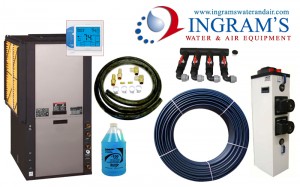22
2011
Geothermal Efficiency Compared to Air Source Heat Pumps
 There are two main types of heat pumps available on the market today: air-source and geothermal heat pumps. Both systems utilize the same kinds of engineering principles to provide heating in winter and cooling in summer. Each system transfers heat from one location in an environment to the other and can reverse cycle depending upon the desires of the homeowner. Both are also generally more energy efficient than traditional heating and cooling systems. So, how do they stack up against each other?
There are two main types of heat pumps available on the market today: air-source and geothermal heat pumps. Both systems utilize the same kinds of engineering principles to provide heating in winter and cooling in summer. Each system transfers heat from one location in an environment to the other and can reverse cycle depending upon the desires of the homeowner. Both are also generally more energy efficient than traditional heating and cooling systems. So, how do they stack up against each other?
Air-source heat pumps provide solid energy efficiency to their owners. As implied in the name, they use the air outside the home as a source and heat sink depending upon what they are doing at the time. Air-source heat pumps are most efficient in mild climates that do not suffer from extreme seasonal cold. For this reason they are most popular in tropical regions where cold weather is never going to become intense, but some moderate heating will be required during the rainy or winter seasons. Air-source heat pumps can also suffer from inefficiencies due to fluctuations in exterior air temperature changes. That leads to the unit having to work harder to do the same job.
By contrast, geothermal heat pumps do not suffer from any of the efficiency problems of air-source heat pumps. It can be weird to think about, but the temperature a few feet beneath the planet’s surface rarely changes in the hottest or coldest weather. The subsurface almost always retains the same temperature to a variance within a few degrees. Since that is the environment a geothermal heat pump uses as source and heat sink, it means the geothermal heat pump does not often have to contest with variational changes in temperature. This equates to a steady energy efficiency no matter how hot or cold it is outside and that provides constant energy savings year round.
In short, due to the the environments involved, geothermal heat pumps are much more energy-efficient than air-source heat pumps.





